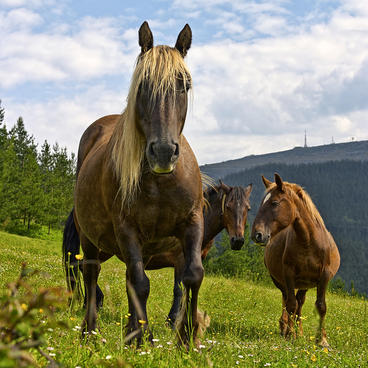Be on the lookout for equine infectious diseases this summer

As summer is officially here, and opportunities to travel with your horse abound, there are some infectious diseases of importance to protect your horse against. Please consult with your veterinarian about specific vaccination recommendations based on your horse’s specific needs.
- Eastern Equine Encephalitis (EEE) also known as sleeping sickness, is a virus spread by mosquitoes that causes inflammation of the brain. Affected horses may show neurologic signs such as tremors, weakness, ataxia (a lack of muscle control or coordination of voluntary movements), or recumbency, or in mild cases, fever and lethargy. All horses should be vaccinated against EEE in the spring, and boosters may be beneficial when traveling to high-risk areas.
- West Nile Virus is also spread by mosquitoes, results in neurologic symptoms similar to EEE, and symptoms may range from mild to severe. Older horses appear to be at greater risk, and all horses should be vaccinated against West Nile virus annually. Minimizing areas of standing water where mosquitoes may breed is also recommended.
- Potomac Horse Fever (PHF) is caused by a bacterial agent, Neorickettsia risticii, and causes fever, severe diarrhea, and laminitis (inflammation of the soft tissue of the foot). Horses at risk live near small bodies of water or travel to endemic areas. Aquatic flies such as caddisflies, mayflies, or damselflies have been found to spread this disease. Keeping barn lights off at night may reduce the number of insects attracted to horse-dwelling areas. The vaccine should be given to horses prior to the peak season (typically late summer to early fall) if your veterinarian feels your horse would benefit from it.
- Strangles is caused by the Streptococcus equi subspecies equi bacteria. It can be spread from horse to horse via humans, nose-to-nose, or by surfaces such as grooming tools, buckets, or tack, and causes a contagious upper respiratory tract illness. Though strangles can be spread any time of the year, outbreaks can be seen following events where horses gather such as shows, trail rides, and rodeos. There are two types of vaccines available for Strep. equi—an intranasal and intramuscular vaccine. Horses with recent exposure to or recovery from strangles may not need to be vaccinated, and a plan should be discussed with your veterinarian. A serum titer may also be measured to determine if vaccination is necessary.
- Rabies is a fatal, neurologic disease spread by bites or contact with the saliva of an infected animal. In Minnesota, rabies is most often spread by skunks, but also bats, raccoons, or foxes. Because of the fatal nature of the disease and the risk of animals spreading it to humans, all horses should be vaccinated for rabies annually. In the summer, animals are left out to graze for longer periods of time, which increases their risk of encountering a potentially rabid animal. Most concerning, the symptoms displayed by a rabies-infected horse can vary, and may include fever, colic, lethargy, incoordination, falling down or recumbency, aggression, inability to eat/swallow, but could mimic symptoms of other common issues or diseases. Humans exposed to rabid animals will need to undergo a series of post-exposure vaccinations to ensure they do not contract the disease. Thankfully, the equine and human vaccinations are very effective in providing immunity, and cases in horses are not seen frequently in the state.
- Equine Infectious Anemia (EIA) is a blood-borne viral disease of horses that can be found worldwide. It is spread by biting flies, such as horseflies, who may carry the virus horse to horse. Clinical signs can be varied from horses having no symptoms (asymptomatic carriers) to fever, lethargy, weight loss, anemia, limb swelling, and small areas of hemorrhage under the skin. There are no vaccinations for EIA, so annual surveillance with a Coggins test is recommended and may be required for interstate transport and/or entry to show grounds and equine facilities. There are no current treatments for the disease, and horses may become lifelong carriers. Horses testing positive need to be isolated in order to prevent the spread of the disease. Owners should avoid reusing sterile needles between horses and take measures to control flies on properties to minimize risks of spreading EIA.
Now that you have your horse protected, get out there and ride!